

|
Contact Us Table of Contents Search Site Google listing of all pages on this website Site Map Toby Johnson's Facebook page Toby Johnson's YouTube channel Toby Johnson on Wikipedia Toby Johnson Amazon Author Page  Secure site at https://tobyjohnson.com Also on this website: As an Amazon Associate
I earn from qualifying purchases. Toby Johnson's books: Toby's books are available as ebooks from smashwords.com, the Apple iBookstore, etc. FINDING
YOUR OWN TRUE MYTH: What I Learned
from Joseph Campbell: The
Myth
of the
Great Secret
III GAY SPIRITUALITY: The Role of Gay Identity in the Transformation of Human Consciousness
GAY PERSPECTIVE: Things Our Homosexuality Tells Us about the Nature of God and the Universe
SECRET MATTER, a sci-fi novel with wonderful "aliens" with an Afterword by Mark Jordan
GETTING
LIFE IN PERSPECTIVE:
A
Fantastical Gay Romance set in two different time periods
THE FOURTH QUILL, a novel about attitudinal healing and the problem of evil TWO SPIRITS: A Story of Life with the Navajo, a collaboration with Walter L. Williams CHARMED LIVES: Spinning Straw into Gold: GaySpirit in Storytelling, a collaboration with Steve Berman and some 30 other writers THE MYTH OF THE GREAT SECRET: An Appreciation of Joseph Campbell
IN SEARCH OF GOD IN THE SEXUAL UNDERWORLD: A Mystical Journey
Books on Gay Spirituality: White Crane Gay Spirituality Series
Articles and Excerpts:
Review of Samuel Avery's The Dimensional Structure of Consciousness Funny Coincidence: "Aliens Settle in San Francisco" About Liberty Books, the Lesbian/Gay Bookstore for Austin, 1986-1996 The Simple Answer to the Gay Marriage Debate A Bifurcation of Gay Spirituality Why gay people should NOT Marry The Scriptural Basis for Same Sex Marriage
Gay ConsciousnessQ&A about Jungian ideas in gay consciousness What Jesus said about Gay Rights Common Experiences Unique to Gay Men Is there a "uniquely gay perspective"? Interview on the Nature of Homosexuality What the Bible Says about Homosexuality Mesosexual Ideal for Straight Men Waves of Gay Liberation Activity Wouldn’t You Like to Be Uranian? The Reincarnation of Edward Carpenter Why Gay Spirituality: Spirituality as Artistic Medium Easton Mountain Retreat Center Andrew Harvey & Spiritual Activism The Mysticism of Andrew Harvey
Enlightenment
Joseph Campbell's description of Avalokiteshvara You're Not A WaveJoseph Campbell Talks about Aging What is Enlightenment? What is reincarnation? How many lifetimes in an ego? Emptiness & Religious Ideas Experiencing experiencing experiencing Going into the Light Meditations for a Funeral Meditation Practice The way to get to heaven Buddha's father was right What Anatman means Advice to Travelers to India & Nepal The Danda Nata & goddess Kalika Nate Berkus is a bodhisattva John Boswell was Immanuel Kant Cutting edge realization The Myth of the Wanderer Change: Source of Suffering & of Bliss World Navel What the Vows Really Mean Manifesting from the Subtle Realms The Three-layer Cake & the Multiverse The est Training and Personal Intention Effective Dreaming in Ursula LeGuin's The Lathe of Heaven Gay
Spirituality
|
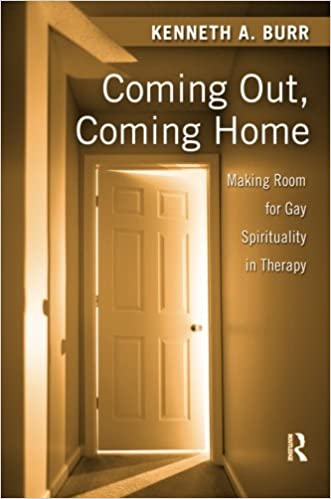 Coming Out, Coming Home: Making Room for Gay Spirituality in Therapy by Kenneth A. Burr Routledge, pb, 273 pages, $39.95 Available from Amazon.com Coming Out, Coming Home: Making Room for Gay Spirituality in Therapy Reviewed by Toby Johnson A
Bifurcation in Gay Spirituality
All religions can be understood to have two sides or aspects: the exoteric and the esoteric. The exoteric aspect of a religion comprises the beliefs, doctrines, rituals and cultural practices of the people as well as the hierarchy and institutions that have grown up around the religious tradition. The esoteric aspect comprises the “deeper core,” or “higher understanding,” of the message behind the doctrines and beliefs, the secret wisdom known to the initiates of the religion who have studied and practiced further into the subtleties of the tradition, as well as the mystical experience of oneness with the truth behind all religion. Gay religion and gay spirituality, too, have exoteric and esoteric aspects. In common usage today, the word “spirituality” is often used to mean the esoteric in distinction from the exoteric “religion.” Though “I’m spiritual” is also often simply used as a cop out from paying any attention to the interior life that is the core of religiousness. Gay spirituality then can mean simply the truth that gay people have interior lives and spiritual interests, that they (we), despite having been so long rejected and vilified by the religions, can be good people, want to live full and moral lives and are “God’s children, too.” Gay spirituality, though, can also mean a certain esoteric wisdom and secret knowledge about the meaning of life and the nature of God that the experience of homosexuality itself can be understood to bestow. There is a bifurcation of gay spirituality: one side for the “masses” and one side for the “initiates.” This insight is necessarily “elitist,” but it is a paradoxical elitism for it places the most reviled of humanity in the privileged position. The way to address the elitism is to understand it as moral obligation and vocation and not as social superiority. As gay, we are not upper class or lower class; we are necessarily de classé. This can make us outlaws or service providers; it can make us spiritual seers.  Coming
Out, Coming Home, written by Seattle marriage and family
therapist Kenneth
A. Burr,
is about exoteric religion and its response to homosexuality as a fact
of human life. It is a wonderful book. Burr is not only a therapist, he
is a Baptist minister, albeit a very progressive Baptist minister, and
his presentation of gay issues is written within a church context. To
some extent, the subtitle properly describes his effort: “Making Room
for Gay Spirituality in Therapy,” but that is only a suggestion of what
this book is. In fact, it is a statement of exactly how most of us gay
men and lesbians who pay attention to religion would want the religions
to understand homosexuality. Burr is a straight man, and he is a
right-thinking straight man who has correctly understood both what
homosexuality is and how the teachings of Jesus should apply in that
psychologically-sophisticated reality. Coming
Out, Coming Home, written by Seattle marriage and family
therapist Kenneth
A. Burr,
is about exoteric religion and its response to homosexuality as a fact
of human life. It is a wonderful book. Burr is not only a therapist, he
is a Baptist minister, albeit a very progressive Baptist minister, and
his presentation of gay issues is written within a church context. To
some extent, the subtitle properly describes his effort: “Making Room
for Gay Spirituality in Therapy,” but that is only a suggestion of what
this book is. In fact, it is a statement of exactly how most of us gay
men and lesbians who pay attention to religion would want the religions
to understand homosexuality. Burr is a straight man, and he is a
right-thinking straight man who has correctly understood both what
homosexuality is and how the teachings of Jesus should apply in that
psychologically-sophisticated reality.The book is based in Burr’s psychotherapy practice and he writes with the sensitivity towards clients’ concerns and priorities that go with being a therapist (more than being a minister of an institutionalized religion with a doctrine to push). He is associated with Seattle First Baptist Church, a church that apparently doesn’t fit the Baptist stereotype. And breaking through the limitations of stereotyping is one of his main efforts in dealing with gay people who come to see him as a counselor: society’s stereotypes and gay people’s own stereotypes about what it means to be gay. To break through those stereotypes and to understand what gay people’s spiritual issues are, Burr looked to his clinical experience, and to gather substantiating data he conducted interviews with gay clients and congregants. The book is a presentation of what he found, replete with case histories and personal reports. What he found will ring true to all of who have thought about these issues from the gay side. This is a book that every Catholic priest (and Pope!) and every Christian minister and practitioner of any other religious tradition ought to be required to read. Burr establishes gay people as good people most of whose “problems” arise from living in a society that does not understand their reality and drives them to be false stereotypes. He deals forthrightly with the various biblical verses that are used against us, intelligently and gently explaining away the anti-gay meaning they’ve been given. I just mentioned Catholic priests, Christian ministers and practitioners of any other religious traditions. One of the most refreshing things in the book is Burr’s openness to other religions and other interpretations of spiritual truth. He really breaks the stereotype of the narrow-minded Baptist, and he does it with sensitivity and respect for all traditions. This is how the straight world ought to think about the gay world. Were it so, so many of the problems that develop in gay lives would never have arisen. For gay men and lesbians discovering their sexual orientation within traditional churches, Coming Out, Coming Home would be a wonderful anodyne to the venom they usually hear from righteous religious leaders. 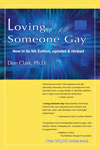 The book is very much a religious version of Don Clark’s classic Loving Someone Gay (which, by the way, Lethe Press, White Crane’s publishing sister, has brought out again in a 5th Edition). In the same way Loving Someone Gay became the bible of gay-oriented psychotherapy, Coming Out, Coming Home ought to be such a bible for pastoral counseling. (Unfortunately, it’s priced at $39.95 for the paperback and $70 for the hardcover—that’s because it’s from Routledge, a very respectable publisher of high quality books for professionals, good for the book’s professional stature, but bad for popular sales.) All that said, I want to balance my enthusiasm for this book by sharing an insight about the nature of gay spirituality which I had while reading it: there’s a bifurcation of gay spirituality, that is, two sides to this discussion: the gay side and straight side. It’s right that this positive, uplifting, truly “Christian”—that is, Christ-like—attitude is what straight people should think about homosexuality. But it is not really what gay people think and it’s not what “gay spirituality” really is. This is a reflection of the familiar phenomenon of gayness as a secret society that understands a hidden subtext of reality that straight people just don’t get. For Burr’s positive presentation of gay life is the assimilated gay life that is dissolved into being just like straight people. All the insights and enlightenment that comes from being outsiders, from gender blending and transcending conventional wisdom is missed. I don’t fault Kenneth Burr for this—in fact, I think he’d personally be open to this idea. (I had an email exchange with him about this and he was really very welcoming.) I think the failure to recognize the “secret” side of gay consciousness comes from the clients and congregants whose lives were the basis for his research. For instance, the interview subjects mention the Radical Faeries and the Body Electric (which Burr cites in passing as evidence of postmodern approaches to spirituality), but they haven’t attended such events and wouldn’t want to. The interview subjects wouldn’t want to march in a gay pride parade (though Burr himself did) because most of the people seemed freakish and that isn’t what “pride” ought to be about. The subjects suggest that what gay people really want is to have non-gay friends and be accepted by straight people, allowed to marry and adopt children so they can be normal. I like my straight friends too, but I must say I think they should be happier to have gay friends than gay people are to have straight friends. In my experience through the years, the kind of friendships I’ve experienced among my gay friends and friendship circles like the early Gay Rap in San Francisco and the Foothills Family in the Rockies and gay camaraderie at such places at Easton Mountain and Gay Spirit Visions has been such joy! There’s something special about gay men’s interaction—especially when it is outside the sexual context; I think it’s because some people never experience gay friendship outside the sexual context that they long for acceptance by non-gay friends. This is a problem for our community, and so coping with the sexual context is one of the ordeals to be overcome on the gay “hero’s journey” and incorporated into one’s spiritual vocation. Throughout the book there’s a subtle dismissal of gay culture. The various styles of the gay lifestyle come off as symptoms of oppression that would go away if gay people were just accepted into society as like everybody else. This isn’t a false message at all. But it is an incomplete one. And while I’d recommend this book wholeheartedly to gay and straight people alike, I’d hope the gay people also had a Harry Hay or Mitch Walker book or a Toby Johnson (if you’ll pardon the self-promotion) to add the other dimension. Our struggle to understand and incorporate our sexual anomaly into our self-perception ought to bring a better boon than that we’re just like everybody else. That’s a parallel here to Burr’s openness to Buddhism as another religion that people might practice. It’s not wrong or abnormal to be Buddhist. God loves Buddhists too. 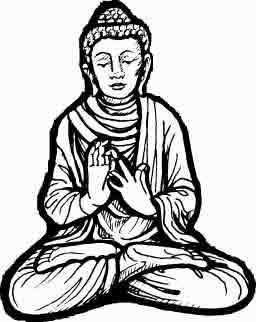 But if you’re really Buddhist and understand that Buddhism has seen beyond the mythology of God to a higher perspective, Buddhism isn’t just another religion, it’s an indictment and a challenge to the very existence of the religions that believe in God. Of course, the good Buddhist would understand that the person who says God loves Buddhists too is really expressing the virtue of lovingkindness in a metaphor and would likely just laugh a hearty Zen-laugh. There is a bold proposal expressed in the subtitle of this book—which is bold whether it has the word “gay” in it or not—“Making Room for … Spirituality in Therapy.” Clinical psychology and psychiatry generally don’t deal with religious beliefs. The efficacy of SSRI anti-depressants, for instance, isn’t dependent on the religious doctrines one believes or doesn’t believe in. So when Kenneth Burr proposes to make room for spiritual issues in therapy, he is expressing a very new-age idea. Prozac, etc. aside, what one believes does affect their mental health. That, indeed, is the point of belief. The reason for believing in certain mythological/archetypal stories is that they affect how you understand your life and reason for being. The project of spirituality is to transform your experience of life by taking responsibility for what you expect and bring about through intention. The goal of the spiritual life is to experience “oneness with God,” that is, to experience being in heaven now. Gay people, in particular, suffer confusion about what intentions to hold for their lives because of their religious upbringing and beliefs. There’s a truly “hero’s journey” we have to go through, obstacles to overcome and interior monster we have to battle to cope with gay identity. The fact that the Churches deliberately choose to vilify homosexuality—in contradiction to evidence and the Church personnel’s own example—and interpret ancient texts to justify anti-gay prejudice damages their gay members self-image and life expectations. It spoils their spirituality; the guides along the hero path pone is supposed to be able to trust are lying. This undermines the Churches’ spiritual authority. If they are as wrong about homosexuality as they are, why would anybody think they are right about anything else? Getting over such religious beliefs is an important step in psychological maturity. And, of course, the education in what the Bible really says and doesn’t say that Burr recommends as part of therapy is important to help religious people transcend those damaging beliefs. But there’s more to it. What I think “gay spirituality” is is not just getting over guilt and learning to “come home” to the Church and be as normal as possible, but discovering how to understand the specific traits and qualities that go with being “abnormal” as spiritual powers and vocations that give meaning and direction to one’s life. 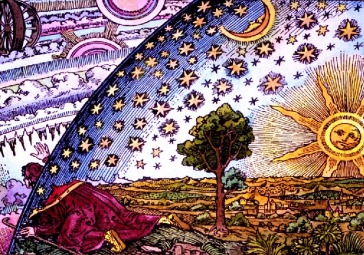 The
goal of gay spirituality, I think, is to find for ourselves—and to
assist other gay people to see—how our homosexuality can be understood
as a clue and an operative practice to experience “being in heaven.”
Meditation and spiritual practice serve to reveal this transcendental
reality; they transform experience so that the world DOES appear and
BECOMES heaven now. For gay people spiritual vision sees how the styles
of gay life can be perceived as—and thereby transformed into—clues to
heaven. The
goal of gay spirituality, I think, is to find for ourselves—and to
assist other gay people to see—how our homosexuality can be understood
as a clue and an operative practice to experience “being in heaven.”
Meditation and spiritual practice serve to reveal this transcendental
reality; they transform experience so that the world DOES appear and
BECOMES heaven now. For gay people spiritual vision sees how the styles
of gay life can be perceived as—and thereby transformed into—clues to
heaven.Gay spirituality shouldn’t downplay homosexuality, it should sacralize it and find spiritual meaning in the patterns of gay life. Gay consciousness has to be sex-positive. If one isn’t strongly sexually motivated, one just doesn’t come out and be gay. So gay people have a drive—and psychological need—to explain sex and sexuality to themselves and to enhance the experience by intentional practice. Hence, gay men’s culture facilitated the modernized interpretation of Taoist and Tantric sexual meditation practices that are taught in the Body Electric Trainings. Gay-positive, sex-positive people will naturally want to discover more layers to sex; we certainly see that in the way men broaden their sexual repertory as they age. The “Bear “ phenomenon demonstrates that. It is truly spiritual to include mystical transformation of sex in that broadened repertory. Gay patterns of free and anonymous sex resonate with the mystical poetry of the Sufis and of, specifically, St John of the Cross whose poem "On a Dark Night" is about discovering that the man he has had anonymous “park sex” was Jesus. For all of us, according to mystical wisdom, are Jesus and Avalokiteshvara and God-incarnate to one another, and should behave so! Gaydar can be an experience of recognizing divinity incarnated all around us, an experience of seeing God in other’s faces. Enjoying porn can provide an opportunity to see God-incarnate pleasuring him/herself and others in the physical world of human sexplay. A porn video is no less arousing, but is transformed mystically, by remembering the porn stars are generously sharing their sexual joys with you and showing gratitude by recognizing divinity in their beauty and attractiveness. The styles of gay men’s sex acts automatically transform ideas about anality and patterns developed in toilet training; this can relieve a whole source of neurosis, while also, of course, requiring education in new, intentional habits of hygiene. Gay and lesbian sexual experience is so different from straight people’s because there is no thought—either as expectation or as fear—of pregnancy. Sex is about something entirely different for gay people. You have to have changed your mind about what sex is for in order to function as gay. Gay sex allows us to be both “male”/active and “female”/passive alternately, sequentially, even simultaneously— transcending, in the physical act of coitus, the distinction between the sexes; comprising, like “God,” both sides of human experience. 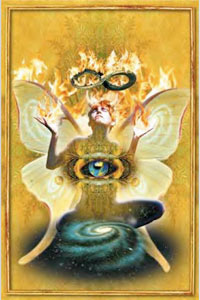 Believing
sex is good and that God can be found in sexual ecstasy creates a
self-fulfilling prophecy. Thinking “Here comes God” as you reach
ejaculatory inevitability and “May all beings be happy, may all being be
free” as you are coming moves the orgasm beyond just a biological
strategy for spreading DNA or a glandular process for relieving
pressure into a practice of the presence of God and an experience of
higher consciousness. This is so-called “sex magick” and it’s a great
contribution of the Radical Faeries, neo-pagans and new-age homosexuals
to collective gay culture. Believing
sex is good and that God can be found in sexual ecstasy creates a
self-fulfilling prophecy. Thinking “Here comes God” as you reach
ejaculatory inevitability and “May all beings be happy, may all being be
free” as you are coming moves the orgasm beyond just a biological
strategy for spreading DNA or a glandular process for relieving
pressure into a practice of the presence of God and an experience of
higher consciousness. This is so-called “sex magick” and it’s a great
contribution of the Radical Faeries, neo-pagans and new-age homosexuals
to collective gay culture. With sex and incarnation in impermanent flesh comes death. It’s been the reality of sickness and death that has helped awaken the gay community’s spiritual side, just as, in the story of Prince Gautama, seeing sickness and death was the motivation to flee his life of luxury and normalcy with wife and family to seek Enlightenment and become Buddha. The gay encounter with AIDS in the last decades resonates with myths of asceticism, voluntary suffering, mystical substitution and self-sacrifice for the salvation of others—by both the "victims" and the caregivers. Living without children, living without dealing with the differences between men and women, living with the ever-present question of who else is gay around us (gaydar) and wondering who else sees it in us and whether that makes them friends or foes and whether they’re attractive/ attracted to us or not (cruising), having to—or getting to—come out to new people all the time—these are experiences that make our lives different from those of most other people. 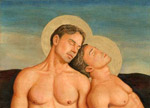 Living without children means living without a vested interest in the future, living in the now where spiritual wisdom says eternity is found. Living without reproducing—and still being a contributing, participating member of human society and being happy and fulfilled—witnesses to an overcrowded world that you don’t have to reproduce to be a full human being. Living differently from other people results in thoughts and feelings of difference. Because there are so many negative messages in society—or simply the absence of messages—about homosexuals and homosexuality, most of us grow up confused and conflicted about our sexuality. This results in what, in gay-oriented psychotherapy, is called “internalized homophobia,” the tendency for gay people themselves to hold negative ideas and judgments of what gayness is and of people who are gay, including, at a deep and subconscious level, oneself. In the way that spiritual practice then is supposed to help people live happier, fuller lives, gay spirituality necessarily addresses patterns of internalized homophobia. So patterns, like thinking people are judging/laughing at you behind your back (called, psychiatrically, “delusions of reference”) or being especially sensitive to rejection (and such self-defeating coping mechanisms as rejecting others first before they reject you), feeling unwanted and unattractive (replicating throughout life feelings of hurt from such events as being last chosen in childhood sports team selection), sabotaging sexual and romantic opportunities by acting neurotically or sabotaging your life with alcohol and the wrong drugs—all these patterns need to be recontextualized and understood. This is spiritual practice as psychotherapeutic. Self-loathing is transformed into self-effacing humility and virtue. Loneliness and bad fortune can become solidarity with the oppressed of the Earth. Acceptance of your fate can be meritful resignation to divine will and embrace of vocation. With spiritual insight, we can see that we resonate with the “karmic patterns” of a long heritage of homosexuals and sexual deviants before us. We resonate with the vibes of two-spirits shamans through the ages of ages of prehuman hunter-gatherer culture; of ganga-smoking yogis and herb-, mushroom- and cactus-eating ecstatics; of taboo-violating Tantrikas and heretics, world-renouncing ascetics and incarnation-embracing bodhisattvas; of wandering monks, warlocks, hermits and pilgrims; of witches, wizards and magicians, Mattachines, mimes and messengers, scouts and wanderers; of bon vivants, counterculturalists and vagabonds; of surrogate parents for nieces and nephews throughout tribal millennia who improved the children’s minds by enriching family life with extra adults; of artists and poets and culture guides through the ages of evolution of civilization. All these human vocations resonate in our lives still. And we can mythically understand our lives in the context of the karmic resonances generated by them—by all the homosexual men and women who’ve come before us. We are an integral part of the evolution of consciousness and we can understand this as spiritual vocation. Talents of gay personality, like style, design and artistry and, perhaps even more important, sensitivity, compassion and drive to service, show us the virtues we can and should cultivate for our spiritual growth. Our gayness gives us a perspective on life and cultural convention; we understand the world, other people’s lifestyles AND religious tradition from over and above; we should strive to be visionaries and world-transformers. Our attraction to same rather than opposite potentially makes us less distracted and obsessed with duality; we are blessed, if we want to be so, with clues to nondual vision, the goal of most of the world’s mystical traditions. Gay spirituality sees that a frivolous whimsy of gay life, like drag (from Radical Faerie-style genderfuck to stage drag and serious female impersonation, from Halloween costume to personal effeminacy) resonate with age-old myths of androgynous, bisexual gods and cross-dressing shamans. With spiritual sight, we see our lovers as reflections of ourselves just as God sees the universe as a perfect reflection of Godself—perfect reflections, not competing, complementary but ever-clashing, opposites. This is a very different way to experience the world from the way most straight people do. And the fact that some straight people ARE resonating with our gay perspective is evidence of the positive influence we are having in the transformation of human consciousness. This is a very different way to experience the world than the traditional religions advocate: there’s no battle between good and evil, no absolute distinction between God and man, nature and God, nature and man, man and woman. This is a new kind of religion. 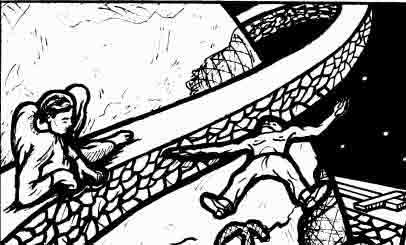 Of course, to get to this stage of creating your own gay religion, you have to have gone through the “hero’s journey” of coming out. There is a necessary maturation process-—learning the skills of self-introspection and self-awareness—that goes with realizing you’re gay. Coming out is a conversion experience. The effort shouldn’t be squandered by then just going back into a closet of normalcy. That’s OK, of course, for people who want to do it; we’re all free to be gay in whatever way we want (that’s the point of this freedom!). But these skills of introspection and awareness can potentially move you higher in consciousness to that experience of being in heaven now. Gay spirituality means to see beyond church, religion and myth in an enlightened vision that arises from your homosexuality so that you understand the clue your sexuality is to who you really are and why you’re here. This enlightened vision isn’t necessarily anti-religious; in fact, it can rejoice in liturgy, music and art as the high culture forms of religious tradition, but it does, necessarily, understand the nature of religious doctrine and moral authority in a new, transcendent way. Choosing to avoid the Body Electric or dissing the Radical Faeries is missing interesting and consciousness-expanding adventures; there is so much neat stuff that gay culture has sourced for us in the past few decades, we should be encouraged to take advantage of it. There is an age-old notion in “gay” subculture that being gay reveals to you a whole ’nother reality that straight people just never see. There is a “secret society,” from the shamans on the savannas to the Knights Templar and Mattachine troubadours to modern gay-identified men and women, who share a “secret,” a “unique perspective” on reality. This is partly just hype, of course, homosexuals DO live in the real world with 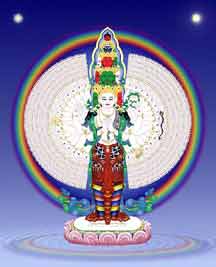 other
people. But there is also a level of self-fulfilling prophecy to the
idea. This is the esoteric aspect of gay spirituality. And the esoteric
secret in all spiritual traditions ultimately is that you are one with
your God, that Jesus, Buddha, Krishna, Avalokiteshvara, etc. are really
symbols of your innermost self, that “Thou Art That” (“Tat Tvam Asi”/”Brahman-Atman”),
that there is no God because it is all God. Because we “believe” in the
secret, we are indeed revealed it and our lives are better, more
productive and contributing and richer for it. At least that is what I
think the therapist should be educating the client about when there’s
room for gay spirituality in therapy. other
people. But there is also a level of self-fulfilling prophecy to the
idea. This is the esoteric aspect of gay spirituality. And the esoteric
secret in all spiritual traditions ultimately is that you are one with
your God, that Jesus, Buddha, Krishna, Avalokiteshvara, etc. are really
symbols of your innermost self, that “Thou Art That” (“Tat Tvam Asi”/”Brahman-Atman”),
that there is no God because it is all God. Because we “believe” in the
secret, we are indeed revealed it and our lives are better, more
productive and contributing and richer for it. At least that is what I
think the therapist should be educating the client about when there’s
room for gay spirituality in therapy.I loved Kenneth Burr’s book and I loved the insight into this “bifurcation of gay spirituality” that the reading inspired in me. The insight itself is a revelation of the “secret.” Link to a You Tube video of Burr discussing his book Note about the word "Bifurcation" I selected the term "bifurcation"-- meaning dividing into two or having two separate layers or realities, being "Janus-faced" (in the expression of Arthur Koestler) -- because I learned the term as a college student in a class on The Philosophy of Science, taught by John Totten, S.M. at St Mary's University in San Antonio. A central idea in modern science is what is called "The Bifurcation of Nature," a term of Alfred North Whitehead's. It was used by the astrophysicist who verified a prediction of Albert Einstein's Theory of Relativity--that light was bent by gravitational force--in a famous article called "Physics and Philosophy" (Philosophy, January 1933). Arthur Eddington posed the problem of whether reality really exists in describing the bifurcation of nature. He noted that his sense impressions and his common sense showed him that the writing desk at which he was sitting was made of solid material that had color, smell, temperature, etc. Science showed, on the other hand, that the desk is made up of tiny spinning particles whirling around each other at enormous speeds and relatively great distances between them; the writing desk is mostly empty space. That is, there are TWO realities. That's Eddington's idea. A movie has recently been made called Einstein and Eddington, a 2008 British TV movie starring David Tennant (Dr. Who) as Arthur Eddington. In the account of the intersection of the lives of these two important scientists of the early 20th C., Eddington is shown to be an active and open (but necessarily discreet) homosexual. Isn't that appropriate? Part of the gay experience is seeing that there are TWO realities: the straight one everybody takes for granted as the real world and the gay one that homosexual experience reveals. Gay consciousness gives a perspective on the world that is self-conscious and detached, emotionally / psychologically--and I would argue epistemologically, as well. We see with "critical perspective," the proverbial "grain of salt" that keeps us from falling for the delusion that everybody else thinks is the world. The same "bifurcation of the world" appears in the thought of the great German philosopher Immanuel Kant. Kant also was apparently a homosexual man. (See Toby Johnson's article on Immanuel Kant & modern-day gay scholar John Boswell.) Discovering this two--or more--layered reality is a kind of True Enlightenment, this is how to understand God and mythology. This is how to discover that you are in heaven here and now!
|
![]()
Toby Johnson, PhD is author of nine books: three non-fiction books that apply the wisdom of his teacher and "wise old man," Joseph Campbell to modern-day social and religious problems, four gay genre novels that dramatize spiritual issues at the heart of gay identity, and two books on gay men's spiritualities and the mystical experience of homosexuality and editor of a collection of "myths" of gay men's consciousness.
Johnson's book
GAY
SPIRITUALITY: The Role of Gay Identity in the Transformation of
Human Consciousness won a Lambda Literary Award in 2000.
His GAY
PERSPECTIVE: Things Our [Homo]sexuality Tells Us about the Nature
of God and the Universe was nominated for a Lammy in 2003. They
remain
in
print.
